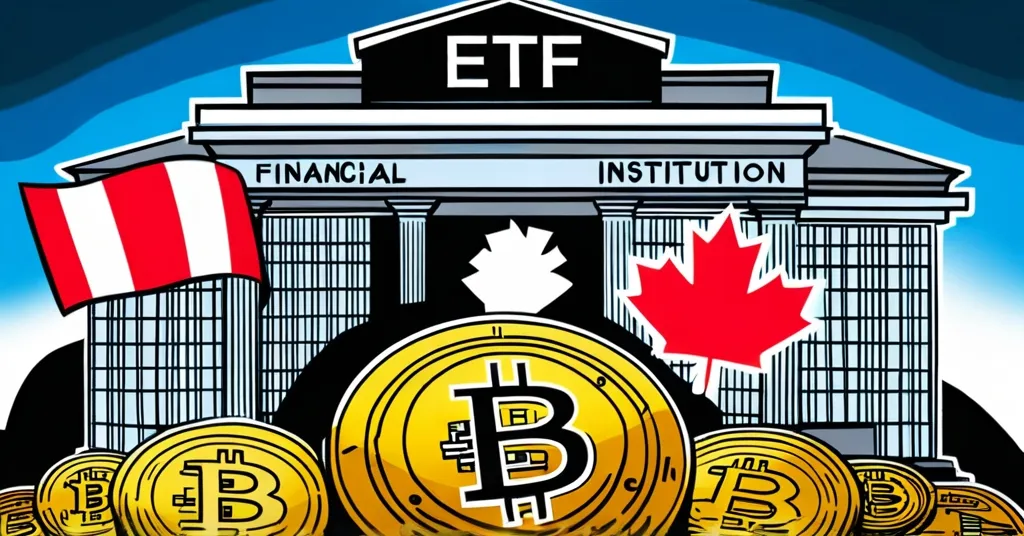BlackRock’s iShares Bitcoin ETF Launches in Canada: A Game-Changer for Crypto Investment

BlackRock’s iShares Bitcoin ETF: A New Dawn for Canadian Crypto Investment
Is BlackRock’s latest move a game-changer for Bitcoin in Canada? The world’s largest asset manager has just launched the iShares Bitcoin ETF (IBIT) on the Toronto Stock Exchange, providing Canadian investors with a regulated and straightforward way to dive into the world of Bitcoin without the complexities of direct ownership.
- BlackRock launches iShares Bitcoin ETF on Toronto Stock Exchange
- Targets Canadian investors with a regulated Bitcoin investment
- Significant step in mainstream crypto adoption
- Attracts both institutional and retail investors
- Raises concerns about centralization and regulatory scrutiny
What is the iShares Bitcoin ETF?
The iShares Bitcoin ETF, or IBIT, is an Exchange-Traded Fund (ETF) that offers investors a way to gain exposure to Bitcoin without having to buy the cryptocurrency directly. An ETF is an investment fund traded on stock exchanges, much like stocks, which tracks the price of Bitcoin. By purchasing shares in IBIT, Canadian investors can now easily add Bitcoin to their portfolios, enjoying the benefits of a regulated investment product.
The Significance of the Launch
The launch of IBIT marks a crucial milestone in the mainstream adoption of cryptocurrencies. With BlackRock’s reputation and reach, this ETF is set to attract a diverse range of investors, from seasoned pros to those new to the crypto scene. The ETF’s introduction has already seen significant inflows, with a whopping $209 million invested on January 6, 2025, alone. This surge underscores the growing institutional interest in Bitcoin, signaling a shift towards broader acceptance in traditional financial markets.
Potential Benefits
IBIT offers several compelling advantages for investors. First, it simplifies access to Bitcoin, making it easier for those wary of the complexities and risks of direct ownership. Second, the ETF is expected to enhance Bitcoin’s liquidity, as more investors, both institutional and retail, engage through this regulated vehicle. Finally, with BlackRock’s backing, IBIT attracts more conservative investors who appreciate the security and credibility of a reputable financial institution.
Concerns and Challenges
However, the launch of IBIT isn’t without its challenges. One major concern is the potential centralization of Bitcoin’s ethos. With BlackRock’s ETF holding about 2.55% of all Bitcoin, there’s a risk that institutional players could gain too much control over the market, potentially undermining Bitcoin’s decentralized nature. Additionally, increased regulatory scrutiny looms on the horizon. While the SEC’s approval of spot Bitcoin ETFs in January 2024 has paved the way for such products, it also brings the risk of tighter regulations that could stifle innovation or alter market dynamics. Expert opinions on the centralization concerns with Bitcoin ETFs highlight the delicate balance between institutional involvement and the decentralized ethos of Bitcoin.
Market Impact
The introduction of IBIT could have a profound impact on the broader cryptocurrency market. By attracting more investors and increasing liquidity, it could drive further mainstream adoption and potentially stabilize Bitcoin’s price over time. However, there’s a flip side: institutional involvement might also lead to volatility spikes if these big players decide to make a swift exit. The ETF’s success could also reshape the retail vs. institutional dynamics, with institutions currently owning around 20% of US Bitcoin ETFs.
Regulatory Landscape
The regulatory environment is evolving, with the SEC’s recent approvals marking a significant shift. This clearer framework encourages more traditional financial institutions to embrace cryptocurrencies, but it also means increased oversight. As regulatory bodies like the SEC continue to monitor the market, the balance between regulation and the decentralized spirit of cryptocurrencies remains a hot topic of debate.
Technological Integration
IBIT leverages a multi-year technology integration with Coinbase Prime, the world’s largest institutional digital asset custodian. This partnership ensures robust infrastructure and scalability, with BlackRock’s Aladdin platform supporting $3T in ETFs globally. Such technological prowess underscores the potential for Bitcoin to be seamlessly integrated into investment portfolios, offering diversification and a hedge against traditional market volatility. The impact of cryptocurrency adoption on traditional markets is a subject of much discussion, as seen on Quora.
Bitcoin enthusiasts might be thrilled, but they’re also biting their nails over what this means for decentralization. The risk of centralization looms large with BlackRock holding a hefty chunk of Bitcoin. Yet, as we embrace this new dawn, we must also stay vigilant. The balance between welcoming institutional money and preserving Bitcoin’s decentralized nature is delicate. While this is a significant step forward, it’s crucial to consider the potential challenges.
Key Takeaways and Questions
- What is the iShares Bitcoin ETF?
The iShares Bitcoin ETF is an Exchange-Traded Fund launched by BlackRock, available on the Toronto Stock Exchange, designed to provide Canadian investors with a regulated and simplified way to gain exposure to Bitcoin.
- Why is the launch of this ETF significant?
The launch is significant because it represents a major step in the mainstream adoption of cryptocurrencies, offering a regulated way for investors to engage with Bitcoin, potentially increasing its liquidity and acceptance in traditional financial markets.
- Who are the target investors for this ETF?
The target investors are Canadian investors, both institutional and retail, seeking a straightforward way to invest in Bitcoin without the complexities of direct cryptocurrency ownership.
- What are the potential benefits of the iShares Bitcoin ETF?
The potential benefits include increased accessibility to Bitcoin for investors, enhanced liquidity, and the backing of a reputable financial institution like BlackRock, which may attract more conservative investors.
- What are the concerns associated with this ETF?
Concerns include the potential centralization of Bitcoin’s ethos, as well as the possibility of increased regulatory scrutiny which could impact the overall cryptocurrency market.
- How might this ETF impact the broader cryptocurrency market?
The ETF could increase Bitcoin’s liquidity and acceptance in traditional financial markets, potentially driving further mainstream adoption. However, it may also lead to increased regulatory oversight and discussions about the balance between regulation and decentralization in the crypto space.



